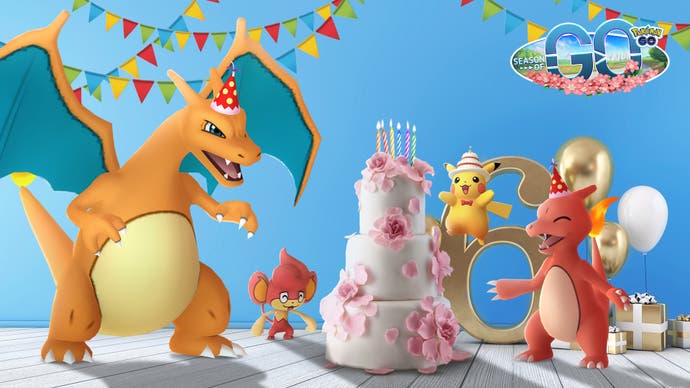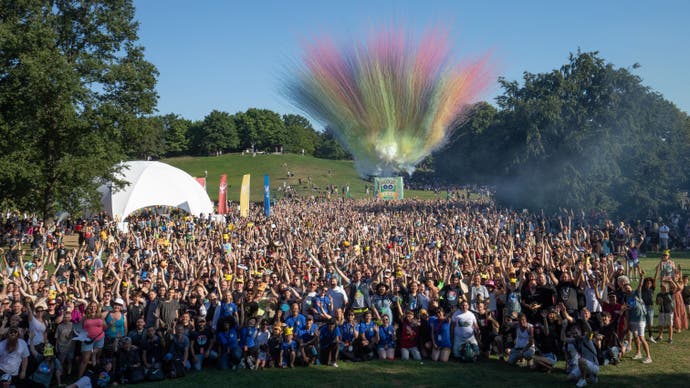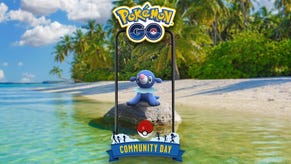State of the Game: Pok¨¦mon Go - the phenomenon that's now a wonderful routine
Having a ball.
It's got to the point where my phone is unlocked and Pokémon Go is open in my hand as soon as I leave the house. A twirl of the map screen, a quick survey of the local area, and I'm off. On the days I don't have something or somewhere specific to walk at lunch, or after work, I let the game choose my route. A creature on the Nearby radar, a gym or raid to battle on the horizon. Job done, daily step count up, dopamine gained.
This month is Pokémon Go's sixth anniversary and yes, six years on, a lot of people still play Pokémon Go. Perhaps that's not a surprise - with a launch that big, any game would linger on in the public consciousness, and on the billion or so devices it has been downloaded upon to date. But that, of course, is not why millions of people still regularly play - and the reasons why people do are as diverse as its player base.
Pokémon Go is still primarily a collection game, built on a hugely successful live service model which continually rolls out new events, rotates available creatures, tempts you with exclusives, and lets you do it all while showing off to others. What's your Pokédex total? How many Shiny Pokémon? How good are their stats? Pokémon Go is the perfect franchise for Niantic's real-world exploration model - and if this was a State of the Game for Niantic, or indeed the genre of game Pokémon Go helped popularise, I'd have a lot of things to say about how no one (including Niantic) has ever come close to topping it.
Outside of collecting, Pokémon Go continues to find success and retain players for a multitude of other reasons. Exercise is a major focus for me, and was so especially during earlier stages of the pandemic when there was little else to do. Exploration is another, something I enjoy when I have a bit more time on my hands, and can find somewhere I've not yet been that's further afield. I sometimes describe Pokémon Go as "walking but more fun", and the same is true of going somewhere new, where the game also acts as a rough street map, locals guide and souvenir collection all in one.
And then, of course, there's the social interaction - from the friends I've made playing the game over the years, to older pals I keep in touch with to talk over our recent catches, or what we thought of the latest event. For the very broad spectrum of people who play Pokémon Go, it has become a part of their everyday and as straightforward a conversation topic as, I imagine, football is to others. Every day, I see people in my area playing the game. Later this year I'm excited to watch two friends who met while playing the game get married.

Pokémon Go's community naturally also extends online, and it's here that wider issues with the game are constantly aired and discussed. Pokémon Go is still unpicking itself from the early Covid-era changes developer Niantic has admitted went too far to allow people to play from their sofa. In the past month, in-person-only raids have been introduced for Community Day events as a carrot to get people playing together in-person, and other bonuses have been rescinded. Still, Niantic memorably had to backtrack its plans to revert the game's extended location interaction distance after enormous pushback from community leaders and key content creators.
So, in 2022, what is there to do in Pokémon Go? Apart from catching and raids, trading and battling, Pokémon Go has a never-ending live service of events and new releases to keep up with. Last weekend was the game's first in-person Go Fest event in three years, which I travelled to Berlin for, though there was a mini event and a collection of things to nab in-game available everywhere in order to promote it and other upcoming ticketed gatherings across the summer. Currently the game hosts a sixth anniversary event, where you can catch a Pikachu costumed in a fancy cake outfit and Charizard in a party hat, among various other things.

The introduction of in-game seasons has further structured the game, and provided a framework for increasingly engaged storytelling. This season, for example, has seen the disappearance of Pokémon Go's hunky mentor figure Professor Willow, with a mysterious new character named Rhi now front-and-centre instead to introduce the recent arrival of the Pokémon franchise's Ultra Beasts. Recent artwork teasing the game's next 12 months has also revealed two more new characters, one of which may well be tied to a long-awaited Route Marker feature Niantic has been quietly working on in the background for years.
Finally, a word on the Pokémon themselves - the things that keep people playing and mean Pokémon Go is a game that can never really be completed, as there's always something new to be working towards or levelling up. Pokémon Go now hosts a variety of creatures from nearly every region visited in the franchise's main series games and accompanying anime, but continues with a drip feed of the remaining new species on a semi-regular basis. Pokémon Go's menagerie has now grown so broad you'd likely need to play across a year to have access to everything launched so far - and this year’s Pokémon Scarlet and Violet will only add to that further. After six years, and with so much to play for, it seems Pokémon Go will still have millions of players trying to catch ‘em all for many more years to come.
This piece is part of our State of the Game series, where we check in on some of the biggest service games running to see how they're getting on. You can find plenty more pieces like it in our State of the Game hub.









